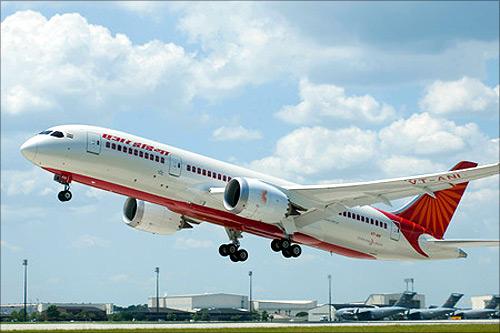'Since the government will not hold any significant stake in the airline this time, such restrictions are not required anymore.'
Arindam Majumder reports.

The government is planning to liberalise the terms and conditions for the sale of State-owned carrier Air India.
The changes would allow a potential buyer to go for a stake sale of the airline immediately after acquiring it.
The revised norms would also enable merger or reverse merger of Air India with any existing business of the buyer.
At least a 95% stake of Air India will be up for sale while retaining 5% for the employee stock option.
This is the first time the government will relax rules for strategic divestment, meant to prevent asset stripping.
The rules were framed to safeguard the government following the divestment of Centaur Hotel, Mumbai, where the Comptroller and Auditor General had pointed out irregularities in the sale process.
The relaxation of the rules was proposed by transaction advisor EY as multiple entities during the last sale process in 2017 had objected saying it restricted the bidder from raising capital from the market and developing synergy with existing business.
According to senior government officials involved in the sale process, there will be no restriction on change in shareholding by the selected bidder.
Even in case the bidder is a consortium of multiple entities, it would be allowed to do a share sale. This will allow the new owner to raise capital by way of share sale.
Last time, the government had made it mandatory for a selected bidder to lock in its entire shareholding in Air India for a period of three years.
Such restrictions on change in shareholding were also applicable when a particular investment was through a special purpose vehicle.
"Any entity which is willing to buy and turn around Air India’s operations will have to do a significant capital infusion immediately. Raising debt will not be easy as Air India is a loss-making company. Hence, the company should be allowed to offload shares and raise capital for this purpose," a senior government official involved in the sale process said.
The bidders will also be allowed to do sale and leaseback transaction of Air India's aircraft to raise capital.
Out of 138 aircraft (69 Airbus and 69 Boeing) in Air India's fleet, around 62% are owned by the airline.
With sale and leaseback transactions, the new owner will also be able to raise capital.
"A substantial amount of the existing debt will be passed on to the bidders. The annual interest outgo on this debt will come to around Rs 2,000 crore. Raising capital to run Air India's operations will be significant for the new owner," the official said.
A clause enabling bidders to merge and reverse merge Air India with their current business would help a potential suitor like Tata Sons, which has two airline companies -- Vistara and Air Asia India.
An entity can also use reverse merger to offset Air India's losses for future tax benefits
Earlier, it was made mandatory for a bidder to operate Air India at arm's length from its other business till the time there was government shareholding in the company.
The government had put a 76% stake of Air India on sale in 2018, but it had failed to generate any interest from buyers. A no-show had forced the government to call off the sale.
Prospective bidders had termed onerous conditions and the 24% government holding among the primary reasons for lack of interest.
"Since the government will not hold any significant stake in the airline this time, such restrictions are not required anymore. The new owner should be given full freedom on how to run the business," a source in the know said.













 © 2025
© 2025